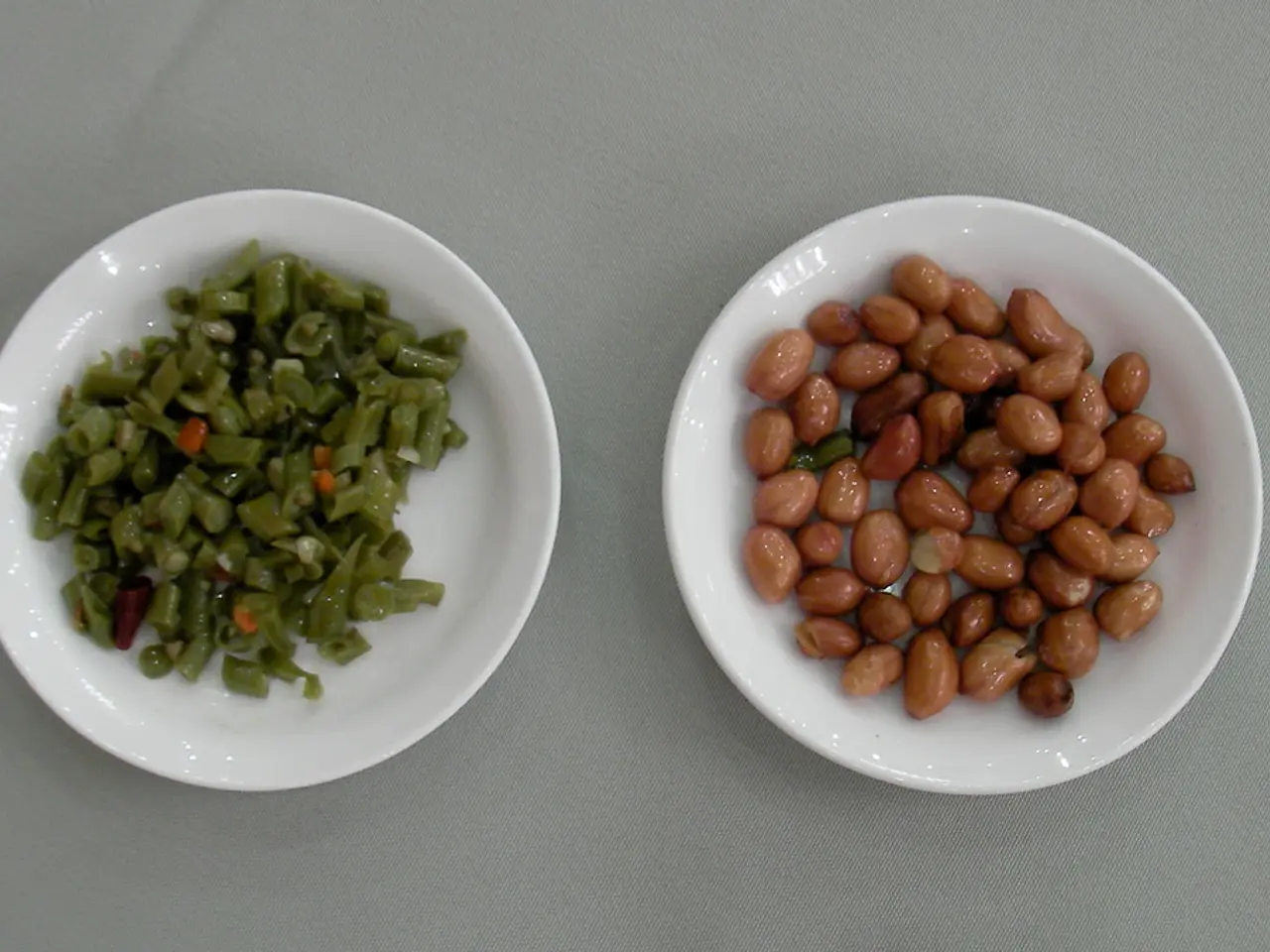Consuming peanut butter before hitting the hay: Harmless or Harmful?
Peanut butter, a popular pantry staple, is not just a tasty spread but also a nutrient-dense snack that offers several benefits when consumed before bedtime.
This humble food item contains tryptophan, an amino acid that promotes relaxation and the production of sleep-regulating neurotransmitters like serotonin and melatonin [1][5]. The absorption of tryptophan is enhanced when peanut butter is eaten with a carbohydrate, which can help the body ease into rest.
Moreover, peanut butter is rich in magnesium, a mineral known for its calming effects on the nervous system and muscles. A small amount (about 2 tablespoons) can help prevent nighttime restlessness and cramps, supporting deeper, more restful sleep [1][2].
The healthy fats and protein in peanut butter digest slowly, providing steady energy that helps avoid blood sugar dips during the night, a common cause of waking up [1]. This means that a pre-bedtime, nutrient-dense snack, such as peanut butter, may help maintain stable blood sugar levels.
In addition, the protein-rich but not overly heavy nature of peanut butter can curb hunger before bed, preventing disruptive late-night snacking that might interfere with sleep and weight management [1]. The combination of protein, healthy fats, and fiber in natural peanut butter helps keep you full longer, potentially reducing overall calorie intake and nighttime overeating [1].
The comforting routine of eating peanut butter at bedtime may have a psychological relaxing effect, signalling the body to prepare for sleep [1]. It is worth noting that natural peanut butter is preferable because it lacks added sugars and unhealthy fats, which could counteract these benefits or disrupt sleep if consumed excessively.
The Food and Drug Administration (FDA) states that all peanut butter must contain at least 90% peanuts in the final product [6]. Choosing peanut butter comprising only peanuts means there are no added sugars or fats.
It's important to remember that portion size is crucial. A snack should not exceed 250 calories and should count towards a person's daily total of calories. Daily caloric needs for adult females range from 1,600 to 2,200 calories, while adult males need between 2,000 and 3,200 calories [3].
Improved sleep quality has associations with a higher protein intake, especially in combination with regular exercise [4]. So, if you're looking for a nutritious bedtime snack, natural peanut butter could be a good choice.
[1] WebMD. (2021). Peanut Butter: Health Benefits and Nutrition Facts. [online] Available at: https://www.webmd.com/diet/ss/slideshow-peanut-butter-health-benefits
[2] Healthline. (2021). 6 Proven Health Benefits of Magnesium. [online] Available at: https://www.healthline.com/nutrition/6-proven-health-benefits-of-magnesium
[3] Mayo Clinic. (2020). Calorie needs and daily calorie intake. [online] Available at: https://www.mayoclinic.org/healthy-lifestyle/nutrition-and-healthy-eating/in-depth/calories/art-20048389
[4] Healthline. (2021). How Protein Affects Sleep. [online] Available at: https://www.healthline.com/nutrition/protein-and-sleep
[5] National Sleep Foundation. (2021). Tryptophan: The Sleep-Inducing Amino Acid. [online] Available at: https://www.sleepfoundation.org/articles/tryptophan-sleep-inducing-amino-acid
[6] FDA. (2021). Peanut Butter Labeling. [online] Available at: https://www.fda.gov/food/labeling-nutrition/peanut-butter-labeling
- The amino acid tryptophan in peanut butter promotes relaxation and sleep regulation, aiding in better sleep.
- Eating peanut butter with a carbohydrate can enhance the absorption of tryptophan, further improving sleep quality.
- Natural peanut butter, rich in magnesium, can help prevent nighttime restlessness and cramps, fostering deeper, more restful sleep.
- The slow digestion of healthy fats and protein in peanut butter prevents blood sugar dips during the night, maintaining stable blood sugar levels.
- The protein-rich, fiber-rich, and not overly heavy nature of peanut butter can curb hunger before bed, preventing late-night snacking that might interfere with sleep and weight management.
- Choosing natural peanut butter over the processed version can provide numerous health benefits, as it lacks added sugars and unhealthy fats.
- Adhering to a suitable portion size (up to 250 calories) for a pre-bed snack is crucial to ensuring it fits within the recommended daily caloric intake range, which varies based on sex and physical activity level.




